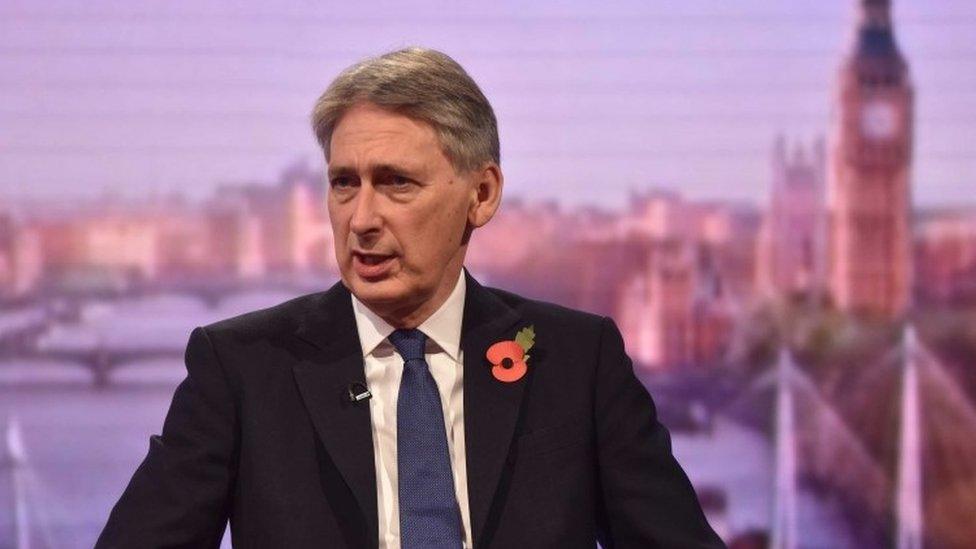Cameron's EU renegotiations a mere sideshow
- Published

So there's Goldilocks, supping with a long spoon, tasting, testing the temperature. Here's what I notice - she no longer cares if the breakfast is denounced as tepid, flavourless fare.
I've long argued that Mr Cameron's problems over renegotiation with the European Union is akin to Goldilocks' porridge problem - finding the temperature that's just right. What is too hot for other European leaders may be too cool for the Eurosceptics in his own party.
What is obvious from his long-awaited speech this week is that he really doesn't care any more about the latter group. That's hugely significant.
It may be very dangerous too - as my grandmother was fond of saying "don't care" was made to care.
The proposed changes to the EU are just about the right temperature for other European leaders to swallow. There will be a lot of fuss and there are real problems that could suddenly blow up.
But my informed guess is that after a bit of ostentatious blowing to cool down what's on offer, they'll sit down and eat. There may be a painfully burnt tongue here and there. Some will jump around squealing for a bit but probably Mrs Merkel will be on hand to do a bit of nannyish coaxing.
The huge subject of migration could be an exception, but Mr Cameron has a get out of jail free card. He can obtain what he wants on benefit changes by getting the UK Parliament to change the rules here - no need for "Brussels" at all. Maybe more on that, another time.
'Pretty thin gruel'
But it is the very palatability for other European leaders that dictates a different reaction at home.
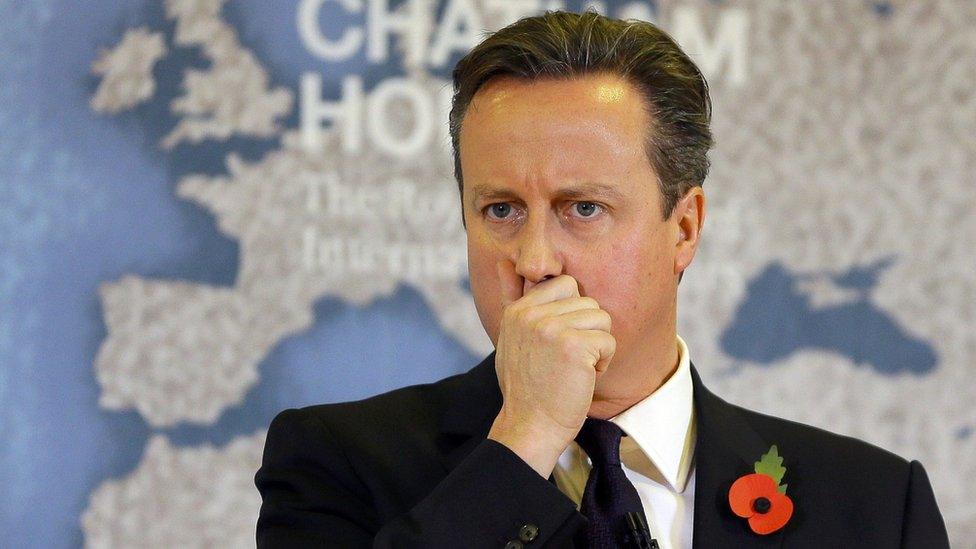
Mr Cameron will be taking a significant gamble if he sidelines the Tory hardliners
These proposals are far too tepid for many Eurosceptics in Mr Cameron's own party. "Pretty thin gruel", external as one, Jacob Rees-Mogg, put it in the House of Commons.
This suggests Mr Cameron has decided there is a large group of Conservatives whom he will never win over - and crucially, that it doesn't matter to him. He is also not giving any detailed ground to diehard UKIP supporters, who'll be voting "no" come what may.
If some feel let down, it is not surprising. Although there is a remarkable coherence in the demands of Mr Cameron's speeches over the last few years, he has also suggested a rather grander scope to his ambitions.
On 23 January 2013, in his much-vaunted Bloomberg speech,, external he argued the EU needed "fundamental, far-reaching change".
He didn't even mention immigration then, but by March last year, external he was saying the EU must have "new mechanisms in place to prevent vast migrations across the continent" and there was also some talk of "bringing back control of Britain's borders".
Later that year he told the Conservative Party conference, external: "I will not take no for an answer and when it comes to free movement - I will get what Britain needs."
If his vision is now less than this, and more technical, Mr Cameron doesn't seem worried about a backlash.
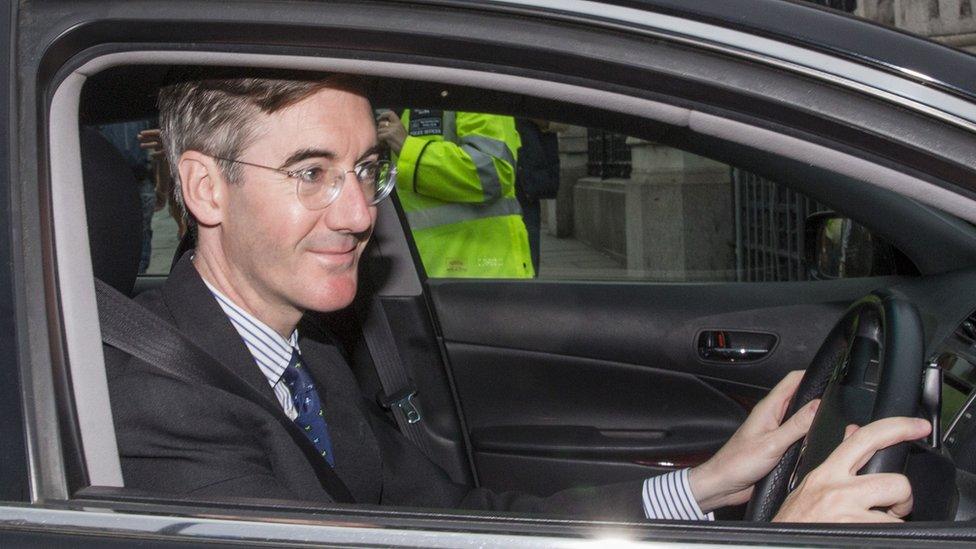
Jacob Rees-Mogg was not impressed by Mr Cameron's proposals
Theatrical renegotiations?
From that flows other important conclusions, one on party management and the other on the big picture.
It must be that Mr Cameron doesn't think that the obvious, existing, unhappiness will tear the Conservative Party apart and lead to mass rebellions and resignations. That suggests he'll be fairly liberal in allowing people to take their own position and is thick-skinned about the brickbats that will be thrown his way.
He may be wrong. If he has misjudged their anger and influence, it could have serious consequences for the referendum itself - if voters see the governing party in open rebellion, claiming the prime minister has got a bad deal, that will surely sway some votes.
But this apparently casual disregard also suggests that Mr Cameron has made the calculation that the renegotiation doesn't really matter very much. Of course he will swear blind that it does, but politically it may be more akin to a piece of theatre than the building blocks of an argument about policy.
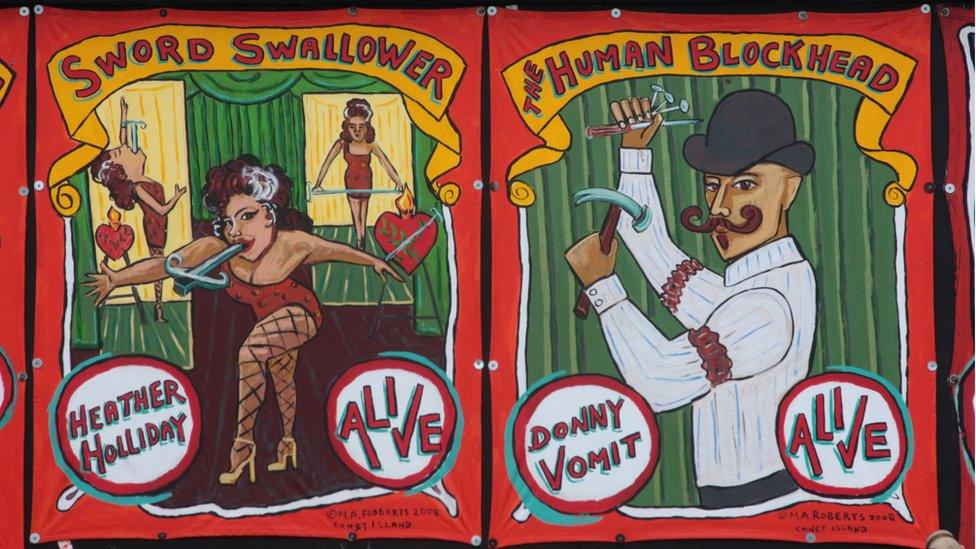
Are the prime minister's renegotiations little more than a sideshow?
I haven't popped down the Dog and Duck recently but if I had I doubt I would have heard a conversation like this:
"I don't give a fig for Brussels but if that nice Mr Cameron gets a protocol attached to a future treaty giving the UK an opt-out from the Lisbon Treaty preamble on ever-closer union - that'll swing it for me."
"Cheers. Quite right Ethel, I was going to vote to get out of the dreaded institution but if there's a promise of treaty change to make sure that the euro doesn't have to be adopted by Sweden and Poland (of course I know we already have an opt-out) that will do it for me."
Gear change
The changes Mr Cameron suggests may bring a future treaty into alignment with current reality and they may or may not be a good thing in themselves. But he's only counting on them in a very broad sense.
The gear shift that Mr Cameron has to perform was always going to be difficult - a graceful pirouette from strongly suggesting we'd be better off out of an EU unreformed, external to arguing the EU reformed is indeed a club worth being in.
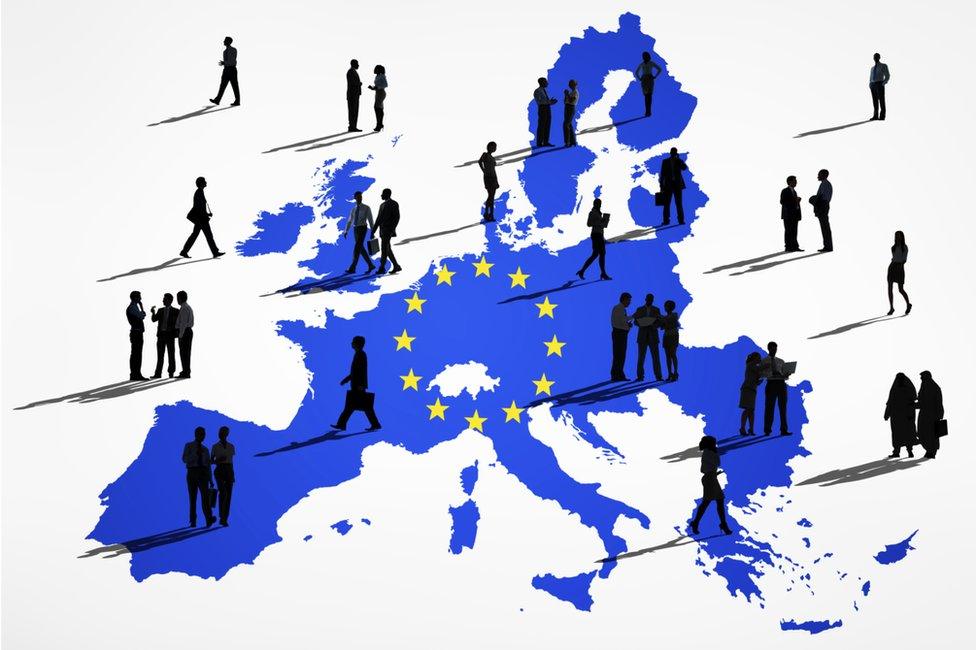
Will Britain vote to remain in the club?
"That thing I was telling you was so awful? Well, we've tweaked it and now it's brilliant."
He will still have to make that awkward argument but it will probably only be central for a week or so, when the actual deal is done.
It is already clear that his real argument doesn't rest on these changes.
He is going to focus on his battle for Britain, arguing he gets what the country needs, and that the EU is in the UK's best economic and security interests.
His plan must be that the renegotiation will be a bit of tidying up, some ammunition for the referendum, but basically a sideshow.
Perhaps I have been over-generous to Mr Cameron. It is at least an irony that a policy forged to appease eurosceptics has disappointed and dismayed them.
What I have portrayed as a strategic decision may be no more than a tactical necessity, the least stupid option available.
After all, if the porridge was too hot for other European leaders he would have two choices - either to climb down and very publicly admit defeat or campaign to leave the EU over a trifle (not a recommended breakfast food).
Both from his point of view are vey bad outcomes. Even open fury from his party is better - its eventual impact on events is at least uncertain.
Whether it is by accident or design or a melange of the two, for a Conservative prime minister to sideline the hardliners is a significant political gamble.

The changes the UK wants
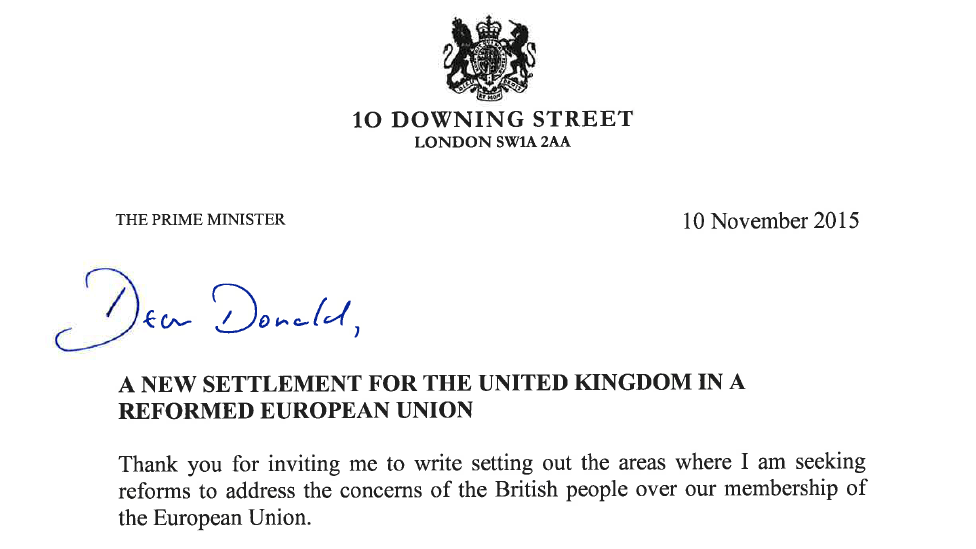
Mr Cameron formally set out his demands in a letter to the president, external of the European Council, Donald Tusk, saying four objectives lie at the heart of the UK's renegotiations:
Protection of the single market for Britain and other non-euro countries
Boosting competitiveness by setting a target for the reduction of the "burden" of red tape
Exempting Britain from "ever-closer union" and bolstering national parliaments
Restricting EU migrants' access to in-work benefits such as tax credits

- Published11 November 2015
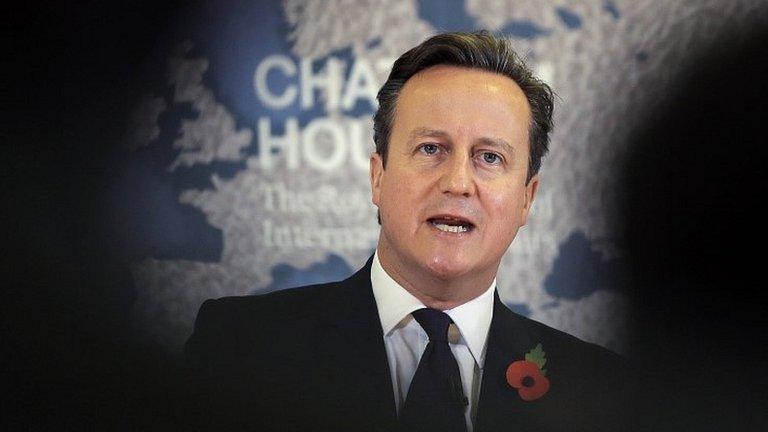
- Published10 November 2015

- Published9 November 2015
- Published9 November 2015
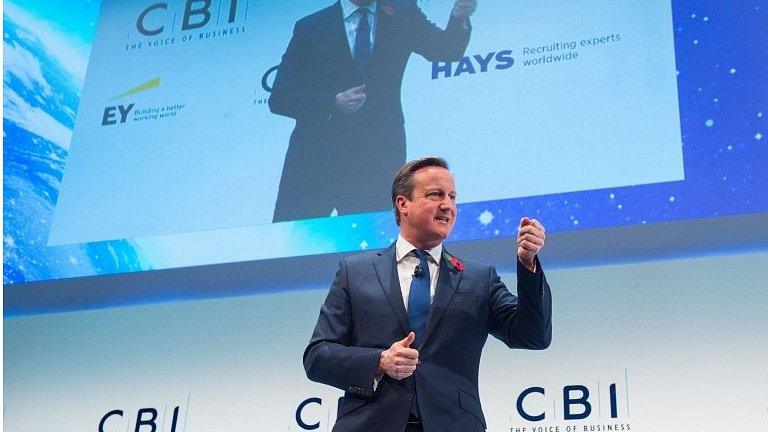
- Published4 November 2015
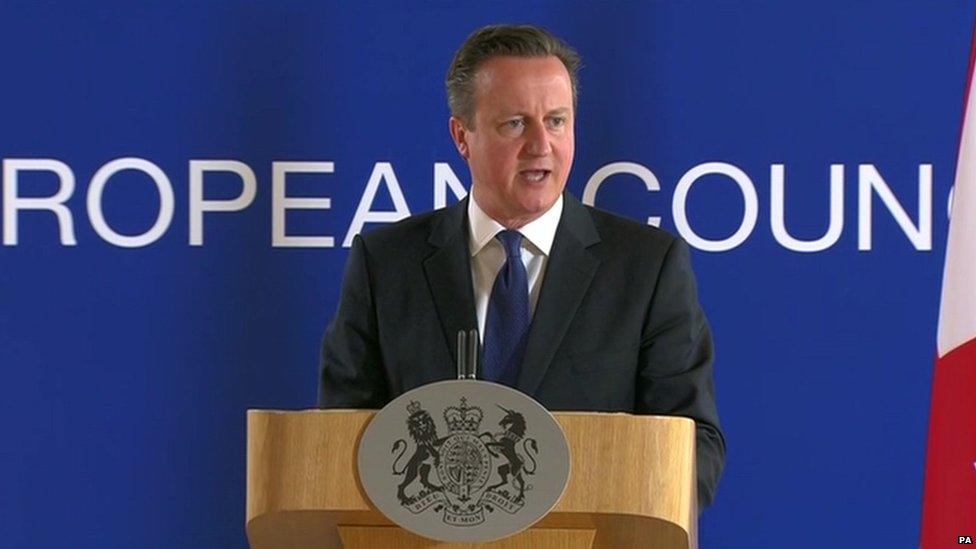
- Published8 November 2015
